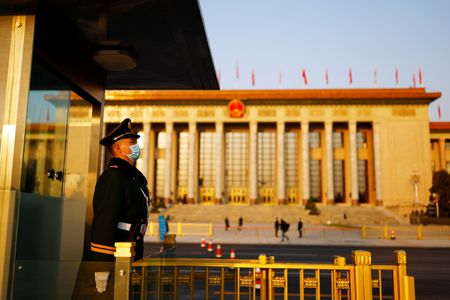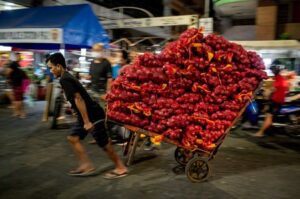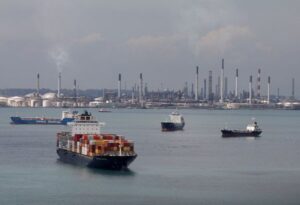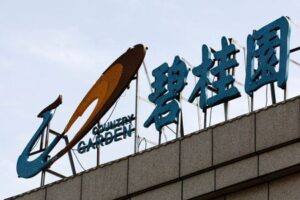By Laurie Chen
BEIJING (Reuters) – China’s rubber-stamp parliament, the National People’s Congress (NPC), begins its annual session on Sunday and is expected to unveil the biggest government reshuffle in a decade as Beijing confronts a host of issues at home and abroad.
Coming months after President Xi Jinping secured a norm-breaking third term as supreme leader, the sessions will further consolidate his authority and outline key government policy goals, including an annual economic growth target sources say could be as high as 6%.
Here are key details and issues to look out for:
WHAT IS THE NPC?
The 3,000-member NPC is China’s national legislature, and in principle the most powerful state body under the Chinese constitution, although in practice the ruling Communist Party wields more power.
Besides meeting annually to deliberate legislation and appoint government personnel, it oversees the State Council, China’s cabinet.
Its top body, the roughly 170-member NPC Standing Committee, meets more frequently to pass legislation. The Standing Committee also has the power to amend semiautonomous Hong Kong’s mini-constitution, known as the Basic Law.
The NPC meetings overlap with those of the Chinese People’s Political Consultative Conference (CPPCC), a political advisory body. Together, the annual meetings are known as the lianghui, or “Two Sessions”, and usually last between one and two weeks.
WHICH GOVERNMENT POSITIONS WILL BE FILLED?
In the biggest personnel change, Li Qiang is poised to be confirmed as premier after being ranked second in order after Xi when the new seven-member Politburo Standing Committee was revealed at October’s congress of the ruling Communist Party.
Li will make his public debut during a televised media conference on the final day of the session, where he will answer questions that have been submitted in advance.
Several top economic jobs will go to a new crop of Xi loyalists, many with little overseas exposure, replacing an older generation of officials viewed as more reform-minded.
Xi confidant He Lifeng is expected to become vice premier overseeing the economic portfolio, while top state bank official Zhu Hexin is likely to replace Harvard-educated Yi Gang as central bank governor, sources have told Reuters.
The NPC will also appoint top government positions including vice president, NPC chair, vice premiers, state councillors, head of the Supreme Court and ministers.
Xi himself will be confirmed in his third presidential term.
WHAT WILL BE DISCUSSED?
The NPC will discuss Xi’s plans for an “intensive” and “wide-ranging” re-organisation of state and Communist Party entities, state media reported on Tuesday without giving details of the changes. Analysts expect the revamp to further deepen Party penetration of state organs.
The NPC will also review draft amendments to China’s Legislation Law, which include authorising emergency lawmaking by the NPC Standing Committee and requiring constitutional scrutiny of laws before they are passed, according to Changhao Wei, fellow at Yale Law School’s Paul Tsai China Center.
Several NPC and CPPCC delegates have put forth policy proposals in recent days, with China’s historically low fertility rate a hot topic.
WHO WILL BE THERE?
This year, 2,977 nationwide delegates have been chosen to attend the NPC and are “broadly representative” of society, state news agency Xinhua reported.
Each provincial-level region is represented by a delegation, as are Hong Kong, self-ruled Taiwan and the People’s Liberation Army (PLA).
According to Xinhua, 26.5% of delegates are women, a slight increase from last year, and about 15% are ethnic minorities, many of whom will be prominent in traditional attire amid the sea of dark-suited delegates gathered in the cavernous Great Hall of the People on the west side of Tiananmen Square.
WHAT ARE THE KEY POLICY ANNOUNCEMENTS?
China will announce its central and local government budgets, military spending budget and economic growth target on the opening day of the NPC.
Among these, the growth target will be the most watched as policymakers try to shore up China’s uneven economic recovery from the COVID pandemic and lockdowns.
The military budget will also be in focus after last year saw the biggest hike in China’s defence spending since 2019, amid U.S. weapons sales to China-claimed Taiwan, U.S. military missions in the South China Sea and a festering border dispute with India.
The figure is closely watched by China’s neighbours and in Washington as a barometer of how aggressively the country will beef up its military.
(Reporting by Laurie Chen; Editing by Tony Munroe and Lincoln Feast.)





